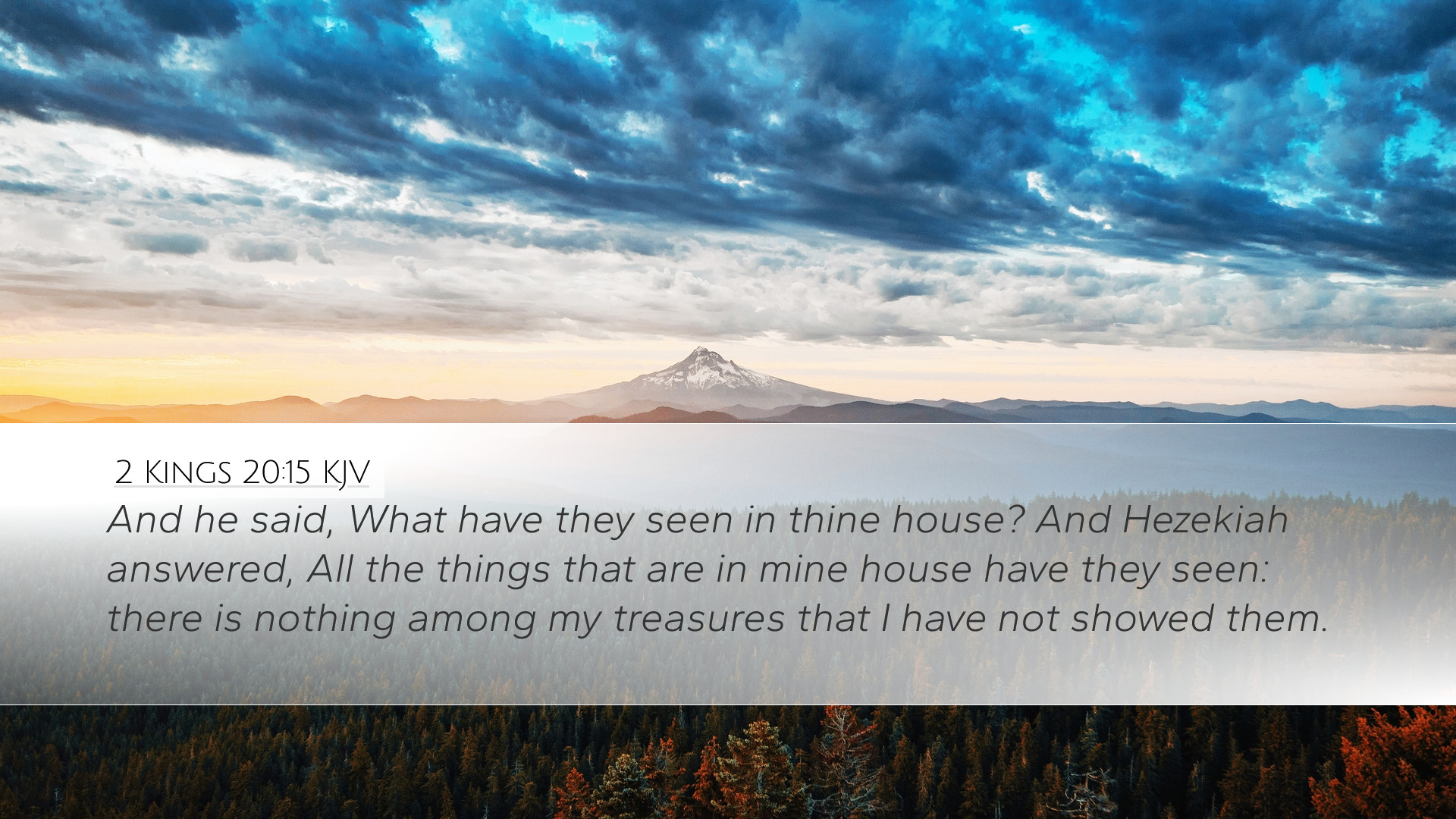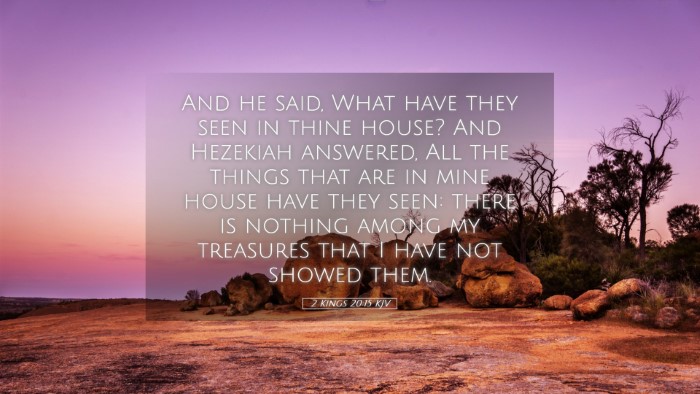Old Testament
Genesis Exodus Leviticus Numbers Deuteronomy Joshua Judges Ruth 1 Samuel 2 Samuel 1 Kings 2 Kings 1 Chronicles 2 Chronicles Ezra Nehemiah Esther Job Psalms Proverbs Ecclesiastes Song of Solomon Isaiah Jeremiah Lamentations Ezekiel Daniel Hosea Joel Amos Obadiah Jonah Micah Nahum Habakkuk Zephaniah Haggai Zechariah Malachi2 Kings 20:15
2 Kings 20:15 KJV
And he said, What have they seen in thine house? And Hezekiah answered, All the things that are in mine house have they seen: there is nothing among my treasures that I have not showed them.
2 Kings 20:15 Bible Commentary
Commentary on 2 Kings 20:15
Verse Text: "And Hezekiah said, What is the sign that the LORD shall heal me, and that I shall go up into the house of the LORD the third day?" (2 Kings 20:15, KJV)
Introduction
This passage presents a critical moment in the life of King Hezekiah, reflecting his dialogue with the prophet Isaiah during a time of personal affliction and national crisis. This commentary synthesizes insights from Matthew Henry, Albert Barnes, and Adam Clarke, elucidating the significance of Hezekiah's request for a sign and its theological implications.
Context and Background
Hezekiah was one of the most revered kings of Judah, known for his faithfulness to God and his efforts to restore true worship. In the preceding verses, the king is informed by Isaiah that he would die from his illness (2 Kings 20:1). However, upon Hezekiah's earnest prayer (2 Kings 20:2-3), God grants him an extension of life and promises restoration.
Historical Context
The Assyrian threat loomed over Judah during Hezekiah's reign. This context of military tension enhances the gravity of his health crisis and the divine intervention that follows. Hezekiah’s desire for assurance reflects both his deep faith and his human frailty.
Exegesis of 2 Kings 20:15
This verse captures Hezekiah's inquiry concerning the sign of his healing. It raises several theological themes that merit exploration:
- Human Desire for Assurance: Hezekiah’s question reveals a common human yearning for certainty in divine promises. Both Barnes and Clarke emphasize that it is natural for believers to seek signs when faced with uncertainty.
- Theological Significance of Signs: Signs served to affirm God's promises, particularly in a covenant relationship. Thus, Hezekiah's request is not mere doubt but a plea for confirmation of God's faithfulness.
- The Third Day: The mention of the third day in this context can be seen as a foreshadowing of significant biblical events, including Christ’s resurrection, encouraging deeper theological reflection.
Insights from Public Domain Commentaries
Matthew Henry
Matthew Henry emphasizes the importance of Hezekiah's faith amid crisis, noting that he initially accepts God’s word through a prophet. His request for a sign indicates a healthy desire for reassurance rather than outright disbelief. Henry underscores that God’s signs both proportionate to the promises made and graciously given serve to bolster faith.
Albert Barnes
Albert Barnes provides a thorough analysis of the language and implications of Hezekiah’s request. He suggests that by asking for a sign, Hezekiah acknowledges his dependence on God. Barnes also sees this as a moment of divine encouragement, showing how God meets the needs of His followers in tangible ways. He notes that a sign is meant to support faith, illustrating God’s willingness to affirm His word to His people.
Adam Clarke
Adam Clarke discusses the complexity of Hezekiah’s character and his relationship with God. He remarks that seeking signs can sometimes be viewed negatively, yet Clarke balances this view by highlighting the biblical precedent for such requests. He argues that God recognizes the hearts of those who seek Him and that Hezekiah’s inquiry was filled with both reverence and hope. Clarke points to the importance of divine signs in the fulfillment of God’s promises, suggesting that they serve to bolster faith within the community.
Theological Reflection
This verse invites a rich theological exploration of faith, healing, assurance, and the nature of divine communication. The act of asking for a sign reflects the interplay between human vulnerability and divine grace.
Faith and Doubt
The duality of faith and doubt in Hezekiah's request invites readers to consider their own spiritual journeys. It reminds theologians and pastors that doubt can coexist with faith and that seeking clarity from God is a natural expression of our reliance on Him.
Assurance in God’s Promises
Hezekiah's story encourages believers to be vocal about their needs for reassurance and to understand that God’s promises require a response of faith. This dialogue between God and His people emphasizes that God is not distant from our struggles but actively engages with our prayers and concerns.
Conclusion
In 2 Kings 20:15, we encounter a profound moment that captures the essence of human experience in relation to the divine. Hezekiah’s request for a sign is a testament to the perpetual need for divine confirmation. Through the insights provided by commentators like Henry, Barnes, and Clarke, we glean a deeper understanding of the interplay between God's promises and our need for assurance. This passage remains a powerful reminder that God is attentive to our requests and that faith often leads us to seek His guidance amid uncertainty.


